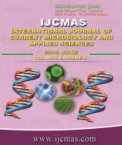


 National Academy of Agricultural Sciences (NAAS)
National Academy of Agricultural Sciences (NAAS)

|
PRINT ISSN : 2319-7692
Online ISSN : 2319-7706 Issues : 12 per year Publisher : Excellent Publishers Email : editorijcmas@gmail.com / submit@ijcmas.com Editor-in-chief: Dr.M.Prakash Index Copernicus ICV 2018: 95.39 NAAS RATING 2020: 5.38 |
Methicillin-resistant Staphylococcus aureus (MRSA) is an important cause of hospital-acquired infections in many countries. Mainly healthcare workers (HCWs) are at risk for Methicillin-resistant Staphylococcus aureus carriage. A total of 100 healthcare workers (HCWs) were screened for carriage of MRSA. Nasal swabs collected from both anterior nares were transported to microbiology laboratory and inoculated on Mannitol salt agar plates. The plates were then incubated aerobically at 37o C for 24 hours and S. aureus was identified. The standard strains of S. aureus were screened for methicillin susceptibility by modified Kirby Bauer method by using cefoxitin discs (30µg) on Muller Hinton agar by using an inoculum density which was equivalent to Mcfarland’s 0.5 standard. Isolates which showed inhibition zone sizes of diameter ≤ 21 mm were identified as MRSA strains. MRSA ATCC 29213 and MSSA ATCC 33591 were used as control for antibiotic susceptibility tests. Overall carriage rate was 15%, with the highest rate in nursing staff (40%) while the lowest in Doctors (26.66%). Female gender was affected more with 66.66%. Health care workers can be a major source of MRSA in our hospital. There is a need for MRSA control policies in hospitals.
 |
 |
 |
 |
 |